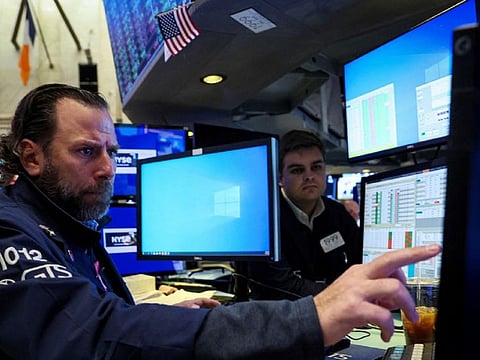Stocks end session lower with Fed hikes in focus
Federal Reserve officials broadly remained steadfast in their fight against inflation

Highlights
- Investors closely watching what Fed speakers say about the outlook for interest rates.
- Several central bank officials have expressed differing opinions on how far they'll go to rate hikes.
- Oil emerged from a volatile session unchanged after Saudi Arabia denied a report that it is discussing an oil-production increase for the OPEC+ meeting next month.
- The dollar gained as investors sought haven assets.
Global stocks mostly fell Monday as renewed concerns about harsh coronavirus curbs in China rattled investor sentiment, while oil prices gyrated as Saudi Arabia denied a report that exporters were weighing a production increase.
China's first coronavirus deaths in six months sparked fears officials would reimpose strict, economically painful restrictions to fight outbreaks across the world's second-biggest economy.
Some of Beijing's largest shopping malls were closed Sunday, while others reduced opening hours or banned table service at restaurants as officials urged residents to avoid non-essential travel.
"No one can tell whether (Chinese President) Xi Jinping would pull back from the reopening plans, which would be another disaster for the Chinese stocks, and for the investor confidence," said Ipek Ozkardeskaya, senior analyst at Swissquote Bank.
Paris, London, Frankfurt and Milan all ended in the red on Monday while Wall Street also lost ground. The fall in European and US stocks came after most Asian markets including Hong Kong's Hang Seng Index and Shanghai ended lower, although Bangkok, Tokyo and Wellington were up.
US investors expect subdued trading during the week, which includes the Thanksgiving holiday on Thursday. This is traditionally a "quiet" stretch for markets.
Oil prices plunged more than five percent early in the session following a Wall Street Journal report that said Saudi Arabia, which co-leads the OPEC+ group along with Russia, and other members were considering an "increase of up to 500,000 barrels a day."
COVID curbs
Mounting concerns that China may tighten COVID curbs after a string of reported deaths also continued to weigh on investors.
Technology stocks, which are typically more sensitive to interest rates, dragged the S&P 500 lower. The Nasdaq 100 ended the day down 1.1 per cent.
Oil emerged from a volatile session largely unchanged after Saudi Arabia denied a report that it is discussing an oil-production increase for the OPEC+ meeting next month. The dollar gained as investors sought haven assets. Treasuries were mixed.
Investors are closely watching what Fed speakers say about the outlook for interest rates. While several central bank officials in recent days have restated their intention to stay on their path of rate hikes, they differ on how far they'll go.
On Monday, San Francisco Fed President Mary Daly said that officials will need to be mindful of the lags with which monetary policy is transmitted through the economy as they raise interest rates further in order to drive down inflation. Her Cleveland counterpart Loretta Mester said she's open to slowing the tempo of rate hikes.
"This shouldn't be regarded as a pivot or anything new," Michael Contopoulos, director of fixed income at Richard Bernstein Advisors, said about Daly's comments. "A real pivot is when the Fed starts to cut rates and/or pause quantitative tightening. That is nowhere in sight."
Atlanta Fed President Raphael Bostic, meanwhile, has said he favors slowing the pace of interest-rate increases, with no more than 1 percentage point more of hikes, to try to ensure the economy has a soft landing. Boston Fed President Susan Collins has reiterated her view that options are open for the size of the December interest-rate increase, including the possibility of a 75 basis-point move.
Traders this week will also be looking to minutes of the most recent Fed policy meeting for further clues on the central bank's path ahead.
"For the Fed right now, if we do get some slowing in inflation - which it seems like we might - but you're not seeing it in the slowing of service inflation, that's related to a tight labor market," Veronica Clark, economist at Citigroup, said Monday on Bloomberg Television. "You do need to see that loosening in the labor market data."
Meanwhile, China saw its first Covid-related death in almost six months on Saturday and another two were reported on Sunday. Worsening outbreaks across the nation are stoking concerns that authorities may again resort to harsh restrictions. Shutdowns could have a negative impact on supply chain dynamics and possibly exacerbate inflation issues across economies.
"China is such a large portion of global growth. It matters. So that's why what news was this morning I think was so important," Lindsay Rosner, multi-sector portfolio manager at PGIM Fixed Income, said by phone. "There is not an expectation in the market of a complete removal of the zero Covid policy. But I think if Covid has taught any of us anything is that it can't be predetermined."
Some of the main moves in markets:
Stocks
- The S&P 500 fell 0.39 per cent as of 5:05 p.m. New York time
- The Nasdaq 100 fell 1.06 per cent
- The Dow Jones Industrial Average fell 0.13 per cent



